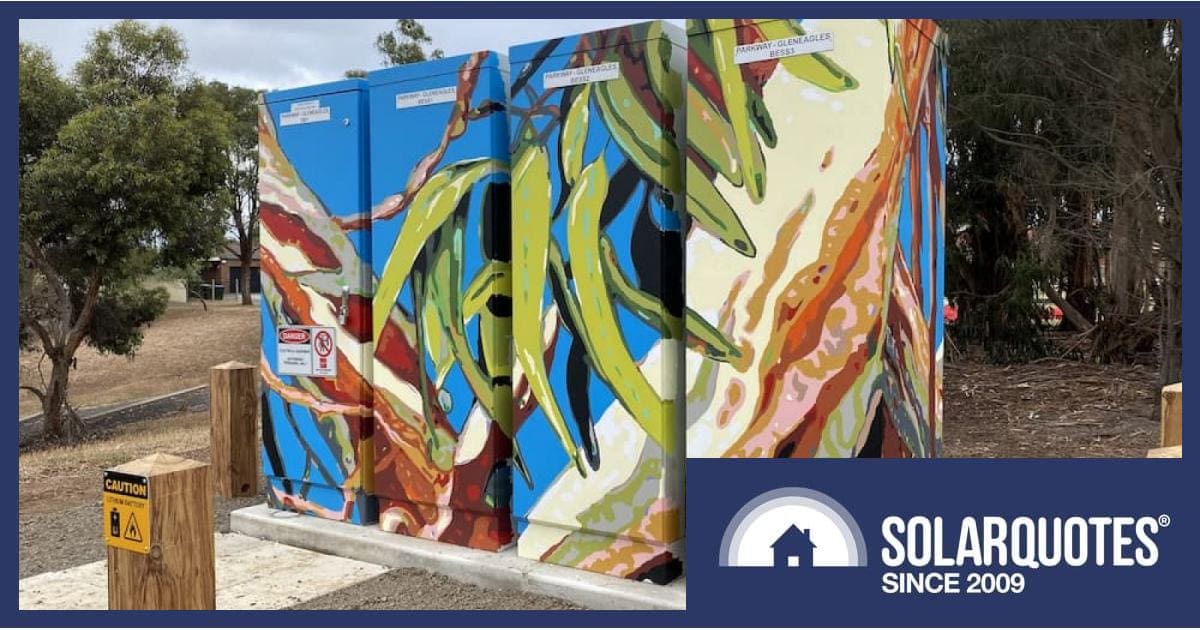
Round 4 of the Victorian Government’s 100 Neighbourhood Batteries Program will open for applications in August – and a new tool will help groups prepare to apply for funding.
A neighbourhood or community battery1 is an energy storage system that is larger than a home solar battery, but smaller than utility scale. These batteries can soak up solar energy goodness from local solar power systems during the day, releasing it when needed – such as during evening peak demand. This can contribute to taking pressure off network infrastructure and avoid more costlier upgrades.
In some models, solar power system owners can “rent” a certain amount of capacity and “bank” their solar output for use in the evenings instead of buying a home battery. There have been trials in Western Australia going back a few years based on this model.
More Application Help In Round 4
Victoria’s $42 million program launched in 2021 and while it considers various models, the focus is on improving local energy network reliability and removing constraints; allowing for more households to install rooftop solar panels.
Scoring cash under the program isn’t just a case of getting together with a few neighbours, then writing to Minister for Energy and Resources Lily D’Ambrosio and asking nicely to plonk one in the reserve at the end of the street. Eligible parties are confined to:
- public entities
- private sector businesses and agencies
- educational institutions
- local government authorities
- co-operatives
- non-profits
… and there’s a fair bit involved. But from this month, organisations are able to access a new tool to help put together a business case and submit an application for funding, plus other support will be available to applicants.
Victoria’s Department of Energy, Environment and Climate Action (DEECA) will provide funding of up to $300,000 per battery for accepted projects, and applicants must be prepared to kick in a cash contribution.
Victorian Parliamentary Secretary for Climate Action Sheena Watt said:
“With the new project readiness tool and one-on-one support for potential applicants, we’re supporting more community organisations to get involved in the 100 Neighbourhood Batteries Program.”
A project readiness tool is available here, but be aware that as at the time of writing that page was last updated on May 30 (mentioned at the bottom of the page), so it may not be the latest version. The announcement referred to the tool as the “Neighbourhood Battery Business Case Tool”.
Are Neighbourhood Batteries Worthwhile?
The idea of community batteries has been pretty popular, thanks largely to Federal Minister for Climate Change and Energy Chris Bowen’s heavily-publicized community battery bonanza. But whether the concept is a good one depends where and how they operate.
This article published on The Conversation last year details some challenges, and says with regard to addressing constraints in the local electricity grid:
“.. we should only turn to them where they are clearly better than the alternatives, such as upgrading transformers.”
Powercor Australia’s “The Powerful Neighbours” report from 2022, which was funded by the Victorian government, noted community energy storage projects are not easily scalable and the model used in one neighbourhood may not necessarily transfer well to another.
Footnotes
- While the terms are used interchangeably, ANU’s Battery Storage and Grid Integration program considers community batteries to be those that directly involve the community in terms of planning, operation and use, while a neighbourhood battery could be owned by an electricity network business to balance supply and demand, and/or to sell the electricity on the wholesale market. Further discussion here. ↩

 RSS - Posts
RSS - Posts



Speak Your Mind